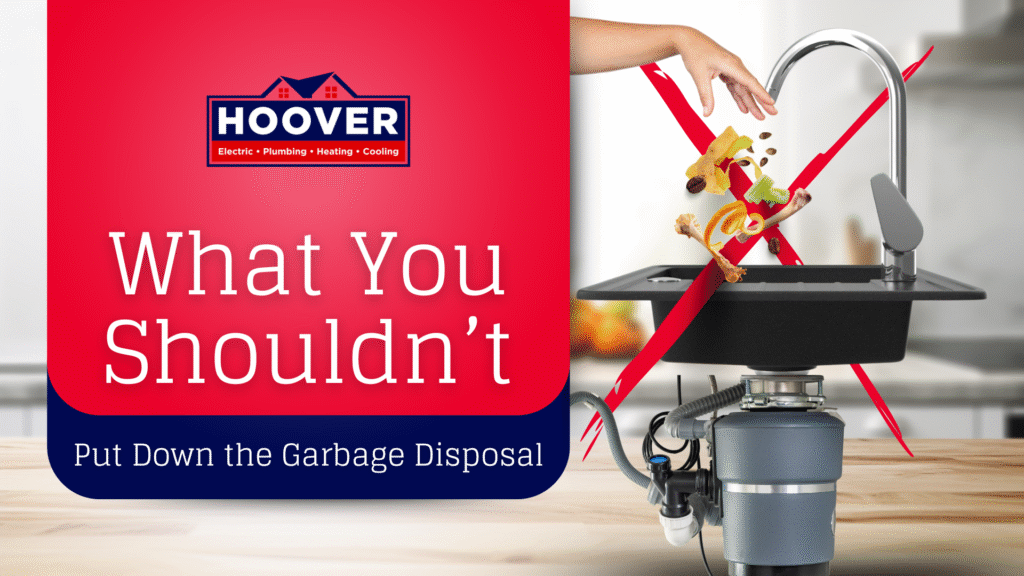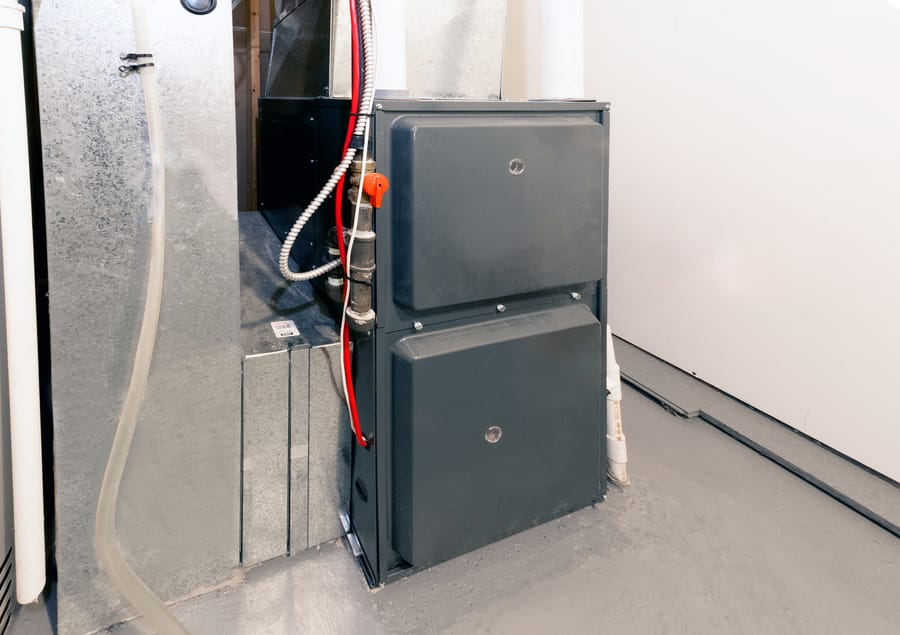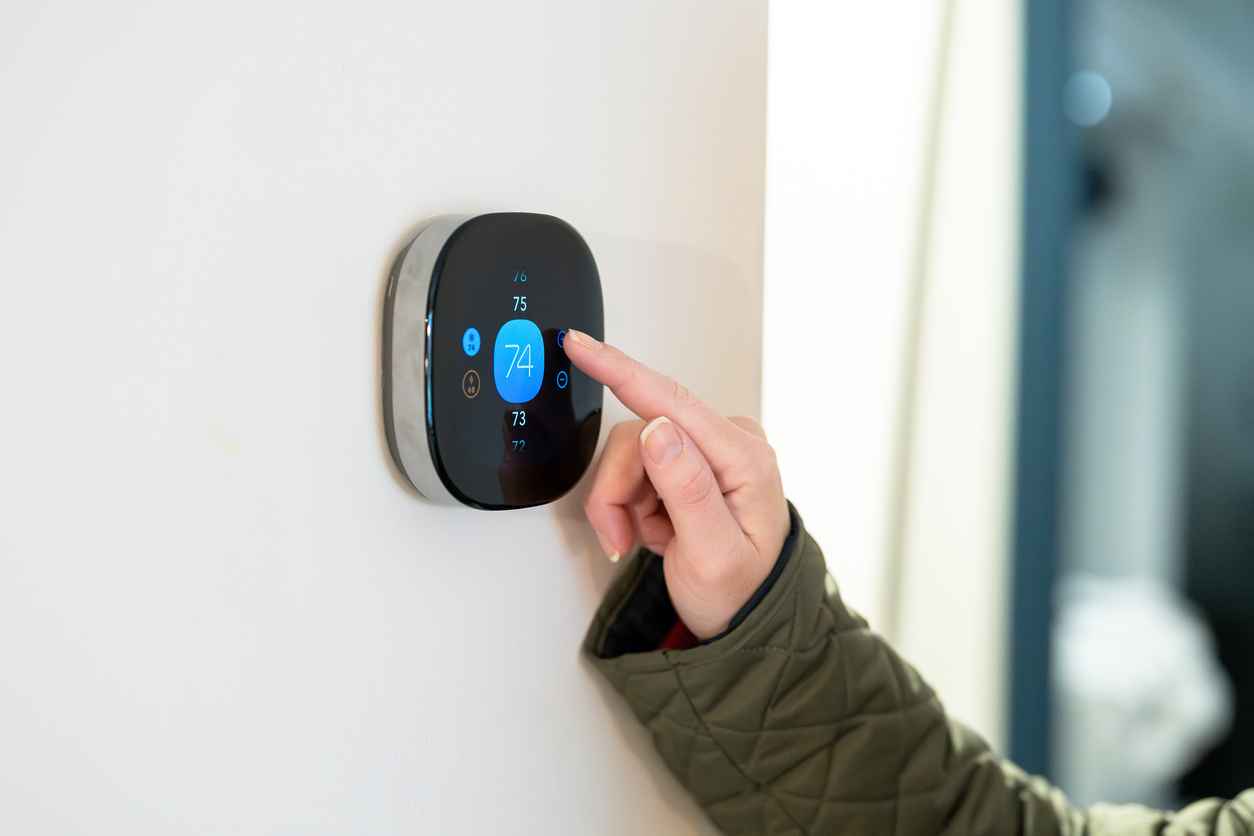Proudly Serving Southeast Michigan
What You Shouldn’t Put Down the Garbage Disposal

A garbage disposal is a very convenient appliance that grinds up food waste at the flip of a switch. However, certain foods and materials can wreak havoc, so it’s important to be careful what you put in your garbage disposal. From nasty odors to stubborn clogs and even full-blown plumbing disasters, improper disposal habits can leave your garbage disposal not working properly. Fortunately, the team at Hoover is here to help with garbage disposal services in Southwest Michigan.
How Garbage Disposals Work (And What They’re Meant to Handle)
Garbage disposals are designed to grind up small, soft food scraps left on dishes and rinse them down the drain with water. Their purpose is to reduce food waste going into the trash and, in turn, into landfills. Garbage disposals are equipped with impellers that spin at high speeds to smash soft food particles into small bits.
Why does misuse cause plumbing problems?
Using your garbage disposal incorrectly causes a chain reaction of plumbing problems:
- Damage to the blades or motor: Hard or fibrous items eventually jam the system or dull the impellers.
- Pipe clogs and sewer backups: Some food particles don’t break down well and can accumulate in your pipes.
- Cost of repairs or replacement: A clogged or broken disposal can cost hundreds to repair and even more to replace. Luckily, Hoover offers competitive pricing and financing options while maintaining great customer service and guaranteed satisfaction.
Top Items You Should Never Put Down the Garbage Disposal
The team at Hoover has compiled a list of things you should never put down a garbage disposal:
- Grease, fats, and oils: If these substances are poured down the drain as liquids, they quickly congeal as they cool, creating sticky blockages in your pipes.
- Coffee grounds: Coffee grounds might seem harmless, but they tend to clump together and settle like sludge in pipes. An alternative is to compost them or use them as soil fertilizer.
- Eggshells: The membranes inside eggshells wrap around the impellers, causing clogs. Toss them in a compost bin instead.
- Pasta, rice, and bread: These foods expand when exposed to water, forming a gluey mess that sticks to pipe walls and causes stubborn blockages.
- Fibrous vegetables: Think celery, corn husks, artichokes, and asparagus. Their stringy fibers are notorious for tangling around the motor and jamming the grinding mechanism. Pumpkin is the worst of all.
- Bones, fruit pits, and shells: These items can break the impellers, wear down the motor, or cause the unit to seize up.
- Non-food Items (plastic, metal, glass): Sometimes, utensils, bottle caps, or wrappers are accidentally sent down the drain. These can destroy your unit instantly.
Surprising Foods That Can Still Cause Problems
Here are some surprising foods that may cause garbage disposal problems:
- Potato peels: Potato peels are high in starch and turn into a thick paste that clogs blades and sticks to the sides of disposals and pipes.
- Onion skins: Onion skins’ thin, papery outer layers slip past the grinding components and lodge in your pipes, leading to clogs.
- Citrus peels: A small piece of lemon or orange peel can help freshen your disposal, but using them in large amounts will overload the system.
What Can You Safely Put In the Garbage Disposal?
When thinking of what not to put in the garbage disposal, ask yourself, ‘Can I mash this food with a fork?’ Soft, small foods are generally safe to put in the garbage disposal.
Soft, biodegradable foods
If used correctly, your disposal can safely handle small amounts of:
- Cooked or soft vegetables
- Soft fruits (without pits or seeds)
- Small pieces of cooked meat (not bones or gristle)
Cold water rule
Cold water helps solidify fats, making them easier to grind and flush through the pipes. It also helps the disposal run more smoothly and prevents overheating. Let the cold water run for at least 15 to 30 seconds after grinding.
How To Maintain Your Garbage Disposal for Long-Term Use
Keeping your disposal clean helps extend its lifespan. Try these once-a-week garbage disposal maintenance tasks:
- Pour baking soda, followed by vinegar, down the disposal. Let it fizz for a few minutes, then rinse with hot water.
- Drop in ice cubes and citrus peels to clean and deodorize.
- Avoid using commercial drain cleaners.
When to call a professional plumber
There are times when calling a professional plumber is recommended. Garbage disposals are connected to both your electrical and plumbing systems, and attempting a DIY fix can make things worse.
Some common warning signs that it’s time to contact a pro include:
- Grinding noises without actual grinding.
- Water backing up or pooling in your sink.
- Persistent odors that don’t go away.
- Leaking water under the sink.
- Frequent resets or power failures.
Trying to fix a jammed disposal yourself is dangerous, especially if you’re unfamiliar with electrical or plumbing systems. A plumbing permit may be required in Michigan for certain repairs.
Hoover’s Garbage Disposal Repair & Maintenance Services
If you need clogged garbage disposal repair or you’re ready to have a disposal installed, call Hoover Electric. We’ve been serving customers in Southeast Michigan since 1980 and offer courteous, professional service. Contact us through our website or call 586-232-9204 today for a free estimate.
Frequently Asked Questions
What should I do if my garbage disposal stops working suddenly?
If your garbage disposal suddenly stops working, turn it off and check the reset button. If the disposal overheats or jams, this button may pop out. Press it back in and try running the unit again. If it still doesn’t work, check the circuit breaker. If none of these fix the issue, call a professional.
Is it normal for water to sit in my disposal when it’s off?
Some standing water in your garbage disposal is normal, but if water is constantly sitting and draining slowly or not at all, it could indicate a clog or partial blockage in the pipes.
Is it okay to use hot water when running the disposal?
Hot water can melt fats and grease, which may then solidify deeper down your pipes and cause clogs. Cold water helps food waste stay solid and makes it easier to grind and flush away.
What happens if I put something bad in the garbage disposal?
If you put something bad down your garbage disposal, you could cause a jam, a clogged drain, foul odors, or damage to the unit.
When You Want It Done Right
Call Hoover!
Our electrical, plumbing, heating, & cooling professionals offer all the services you need under one roof.


